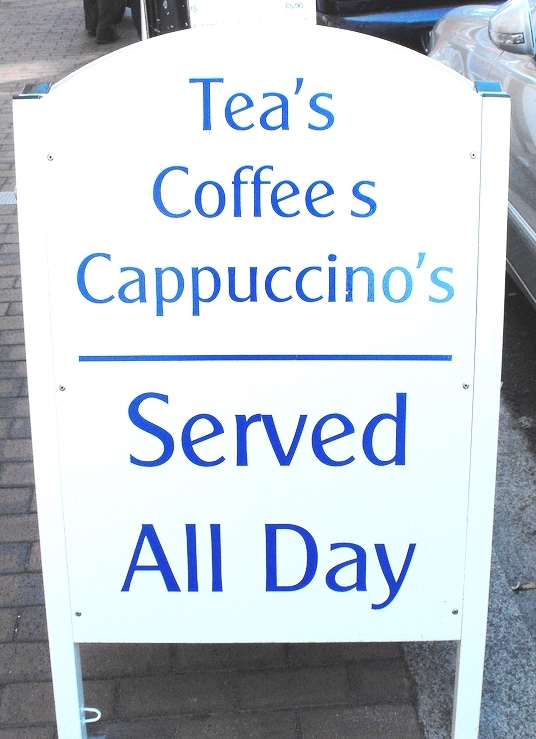Possessing the Apostrophe Posted by Gary Locke on Feb 2, 2017 in English Grammar, English Language

The misuse of an apostrophe drives me crazy. Seriously, I have been known to scream out loud when I see signs like the one pictured. Let’s explain the apostrophe and, hopefully, take steps to make this world a saner place.
An apostrophe is a punctuation mark used to denote either possession, or the omission of at least one letter in a contraction. That’s it. Don’t overcomplicate it. There are rules regarding how to use it, particularly if the possessive word ends in an “s”, but everything you need to know about using apostrophes is really that simple.
Here’s an example:
Chris is a student at Williams College in western Massachusetts. Chris walks into the college’s student lounge to buy two coffees. Just then, Chris’s good friends Pedro and Martin Valdes walk into the lounge. It’s clear to Chris that the Valdes brothers are also there to buy coffees. As much as he’d like to drink them, Chris offers his coffees to the brothers. Just before they take their first sip, Chris tells Pedro and Martin that the coffees he bought are flavored. Pedro asks Chris what the coffees’ flavors are.
“They’re hazelnut coffees,” Chris replies.
Since they’re both allergic to nuts, Pedro and Martin reluctantly hand their coffees back to Chris.
“Thanks, man,” says Martin. “You’re kind to offer, but you can have your coffees back.”
Chris laughed nervously. “Wow, good thing you guys thought to ask.”
Pedro said, “It’s okay. I should have known by its aroma that my coffee was nut-based.”
Martin added, “Enjoy your coffees, Chris. Better drink ‘em before they get cold.”
There’s a lot going on in that story, so let me break it down for you.
- There are three words in the first sentence ending in the letter “s”. However, since neither is being used as a contraction or as a possessive, there is no need for an apostrophe.
- In the second sentence, college is used as a possessive, because the student lounge belongs to the college. So, college has an apostrophe.
- In sentence #3, Chris is a possessive name ending in “s”, so it requires an apostrophe, followed by another “s”. However, according to some English language guides, It would be acceptable to omit the second “s”. Whichever rule you choose to follow in the case of a possessive name ending in “s”, you must remain consistent.
- It’s is a contraction of the words it and is. The apostrophe is required. You may wonder why there is no apostrophe after Valdes in this sentence. In this case, they are the two Valdes brothers, not the brothers belonging to someone else named Valdes.
- In the fifth sentence, he’d is a contraction of he and would. Remember that the apostrophe is an indication of letters missing, so there may be more than one letter absent.
- There is no need for an apostrophe in the sixth sentence.
- Coffees is a plural possessive noun, meaning that the word is already plural and it is the possessive of the word which follows it, flavors. The flavors belong to the two coffees. So, the apostrophe belongs after the “s”,
- They’re is a contraction of they and are. In contrast, their is a possessive pronoun.
- You’re is a contraction of you and are. Your is a pronoun.
- Guys is a plural noun. Thought is a verb. Therefore, there is no possessive in Chris’s response.
- Okay, here’s where it gets really confusing. It’s is a contraction of the words it and is. The apostrophe is needed. However, its is the possessive form of the neuter pronoun it. Possessive pronouns, also including his and her, do not use an apostrophe.
- Finally, I threw in an informal, colloquial abbreviation, ‘em. While not properly a contraction, this is a common shortened version of the pronoun them. While it lacks enunciation and clarity, most English speakers understand it.
And, if I may offer a little advice, when in doubt, look it up. You don’t want to make that sign twice.
Photo by Andrew M. Butler on Flickr

Build vocabulary, practice pronunciation, and more with Transparent Language Online. Available anytime, anywhere, on any device.




Comments:
Mario:
I think it would be better the word contraction than the word conjunction in the sentences 1, 4, 5, 8, 9 and 12.
Thanks for the lesson.
gary:
@Mario You, sir, are absolutely correct. I’m making corrections now. Thank you.